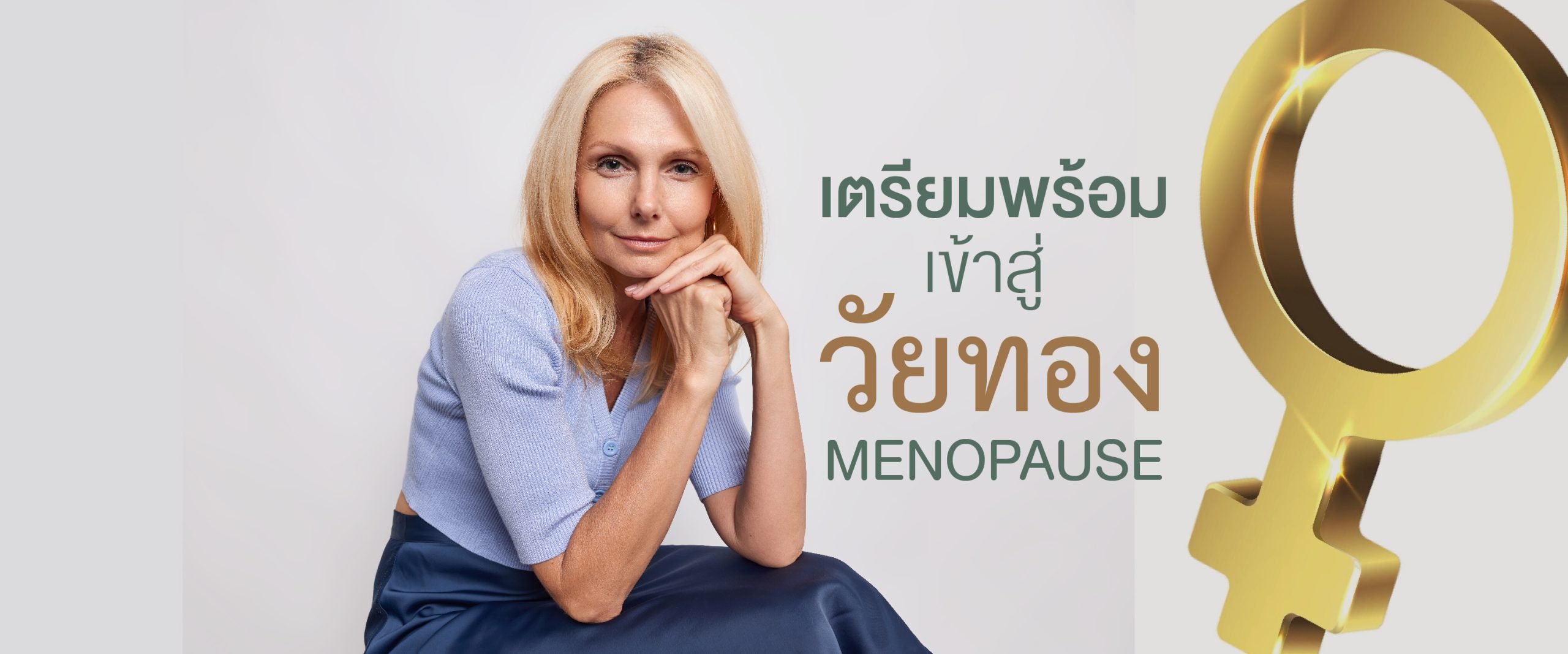
Choose the topic you want to read
Menopause? Who is in menopause?!
Things that menopausal women and those close to them should know for a comfortable life together.
Have you ever experienced anything like the following?
Little things can sometimes make a mother upset with teary eyes.
A wife cannot sleep and gets up to walk around in the middle of the night.
Just a small mistake at work, but the boss goes flaming furious.
A senior colleague lowers the office’s AC temp so much that you have to grab blankets. But when you complain, you get a massive scolding in return.
If so… and she in question is also aged between 45-55 years, then this indicates that someone close to you is entering menopause. Menopause is considered complete when menstruation ceases for a continuous period of 1 year.
Not only might mood swings and hot flashes occur during the transition to menopause, but there are also many other risks that could potentially worsen. Therefore, if you think someone you care for is entering menopause, you should read this article.
And if that person is yourself, you ABSOLUTELY must read this article!!
The nature of any woman involves having eggs in the ovaries from birth, starting with approximately 2 million eggs. By the time of puberty, this number decreases to about 400,000 eggs. Each month, multiple eggs are released simultaneously from the ovaries, possibly up to 20 during adolescence, decreasing with age. As menopause approaches, only 1-3 eggs may be released per month in normal conditions, with only one egg typically travelling into the uterine cavity while the others degenerate. The uterine lining thickens during ovulation to prepare for the implantation of a fertilized egg. If the egg is not fertilized, it dissolves along with the uterine lining, which is known as menstrual blood. This entire process is hormonally controlled.
And if there are no more eggs left in the ovaries, no eggs are released, and no menstruation occurs, that woman will enter (Post-Menopause) But in reality, going for an ovarian biopsy to determine if the eggs are depleted is not a viable approach. So doctors diagnose based on hormone levels instead.
Hormone levels Indicate Menopause

You may be familiar with hormones like oestrogen or progesterone, but what your doctor uses to diagnose menopause is a crucial test for Follicle-Stimulating Hormone (FSH).
The pituitary gland in the brain produces FSH, which stimulates egg growth and readiness for fertilization with sperm. It also stimulates the ovaries to produce oestrogen. Once enough oestrogen is produced, it signals the pituitary gland to stop producing FSH. This cycle continues, but in women approaching menopause, the ovaries may not respond well, even when instructed by FSH, resulting in less oestrogen being produced. If the pituitary gland does not receive the signal to stop producing FSH, its levels remain high. Doctors measure this FSH level through a blood test to diagnose menopause. A higher FSH reading, around 40, according to US standards, indicates a higher chance ‘you are in menopause.’ This number comes from FSH levels observed in women who have undergone ovarian surgery and no longer have viable eggs.
However, FSH hormone levels can fluctuate throughout each menstrual cycle. Therefore, the diagnosis recommends repeating the test in the following month to confirm the results. It should also be accompanied by other indicators such as age, duration of missed periods, health issues, physical changes, medications taken, and so on.
Symptoms During the Transition to Menopause
Women aged 45-55 are in a phase known as menopausal transition, during which the body moves from reproductive age to menopause. During this phase, women still experience ovulation and menstruation and can conceive, although both the quantity of eggs and the chances of conception are significantly reduced. The decreased level of oestrogen hormones due to ovary decline also affects the nervous system and brain function, including temperature perception. That is why your senior colleague in the office still feels hot despite lowering the AC temp so much. This also impacts mood regulation, which is why mothers tend to get upset over little things, while bosses get irritated over small matters. And it affects sleep patterns too; hence, wives often get up and walk around in the middle of the night.
These emotional symptoms and feelings usually fade away once the body adjusts to the changes. For some people, they may last for a few months, while for others, they can persist for up to 3 years or even longer.
In addition, the reduced levels of oestrogen also lead to vaginal dryness, which can cause discomfort and itching. This makes some women less inclined to engage in sexual intercourse. For some families, this can lead to relationship problems. Even after a woman’s body has passed through this transition period, these issues may persist alongside emotional symptoms, continuing into menopause, accompanied by other risks associated with declining hormone levels.
However, not everyone experiences emotional symptoms during this transition into menopause. It depends on genetics, diet, lifestyle choices, self-care, and many other factors. Some people may go through this period without any issues. However, if hormonal changes during this period start to affect one’s quality of life, then it is recommended to consult a doctor for appropriate treatment.
Risks for Menopausal Women
Oestrogen hormones, besides affecting the nervous system and brain function, also help control cholesterol production, reduce harmful fats (LDL), maintain calcium balance in bones, and aid in digestive system function. However, insufficient oestrogen production in menopausal women can lead to conditions such as clogged blood vessels, heart disease, high blood pressure, reduced calcium absorption resulting in bone thinning, osteoporosis, and a weakened metabolism. This can further result in fat accumulation, leading to obesity, or a dry vaginal canal, which cause discomfort and urinary problems.
Entering Menopause with Physical and Mental Well-Being
Taking care of oneself, eating a balanced diet from all 5 food groups, exercising regularly, staying hydrated, getting adequate rest, practising meditation for mental clarity, and avoiding smoking and alcohol, appear to be the paths to good health at every age and stage of life, including transitioning into the golden years with physical and mental well-being.
However, nothing can 100% guarantee that taking care of oneself well will prevent you or your loved ones from encountering issues with the onset of menopause.
Therefore, regular health check-ups can help reduce problems arising from hormonal changes and potential health risks for menopausal women, as mentioned above. If there are physical indications or any other signs, then doctors can diagnose and provide timely treatment without having to wait until the effects of declining oestrogen hormone levels start to impact your health or relationships with your loved ones.
Hormone Replacement: An Option for Anyone in Their Menopause
Because the body reduces the production of oestrogen, it leads to emotional changes and an increased risk of various diseases. Therefore, a commonly recommended option by doctors is synthetic hormone replacement, which helps regulate bodily functions similarly to oestrogen from the ovaries. This can prevent hot flashes, improve mood control, keep the vaginal canal moist, make the skin more radiant, manage cholesterol production, and maintain calcium balance. As a result, it reduces the risk of cardiovascular disease and bone- and joint-related issues.
However, health risks for menopausal women may also arise from other causes. So hormone replacement therapy may not be the most appropriate treatment for everyone, and not everyone can receive hormones. In some cases, receiving hormones can cause more harm than good, such as in cancer patients or those with dyslipidemia. Therefore, it is essential to consult a doctor and receive hormones under strict medical supervision, as our bodies can change over time.
Complete Women’s Health Care at BNH
Besides being a leader in women’s healthcare services for over 126 years, BNH Hospital has unique qualities that encourage our medical service recipients to entrust their health to us over the long term, and pass that trust on to their children and loved ones.
- Expertise: We are a hub for top specialist doctors in nearly every field in Thailand, enabling us to provide comprehensive care for you and your loved ones.
- Innovative care: Whether it’s medical technology, treatment equipment, or medications and medical supplies, we select the best and most appropriate options to provide to our patients.
- Holistic patient care: Provided by a multidisciplinary medical team that promptly coordinates and consults on cases between departments.
- Like taking care of family: Consultations with our doctor have no time constraints. They provide care as if you were a close relative, to ensure your peace of mind. Our staff is also ready to offer services with a warm heart and smile.
Everything at BNH Hospital is focused on providing Complete Care, which is the comprehensive care we are committed to offering to all our patients. For women’s health, we provide care for physical health, mental health, and sexual well-being, to ensure that you or your loved ones are prepared and can enjoy a happy life during menopause.
Physical Health
- Preparation Package for Menopause: A screening package for women aged 35 and over that includes screening for blood sugar levels, liver and kidney function, lipid profile, ovarian hormone levels, pelvic examination, complete check of uterus and ovary function, screening for cervical cancer, and screening for breast cancer.
- Transition to Menopause Package*: Also called a perimenopause, for women aged 45 and above who are entering menopause, this package includes basic screenings as in the first package, along with additional bone density scans for two areas: the lumbar spine and hip.
- Menopause Package*: For women who have been post-menopausal for 1 year and are considered to be in complete menopause. This package includes the same basic screenings as in the second package, with additional tests for bone turnover markers and bone formation markers.
In women’s health check-ups at BNH Hospital, we use the most accurate testing methods. This includes transvaginal ultrasound, which provides more detailed scans compared to abdominal scans for assessing ovarian health, or screening for osteoporosis risk by measuring bone mass along with vitamin D levels in the body. These methods enable precise evaluation by our doctors and ensure tailored care moving forward.
Mental Health
The doctor will assess the mental health of the patient to determine whether the cause is due to hormonal changes or psychological factors, in order to provide appropriate care from our specialised doctors.
Sexual well-being
The doctor will assess the patient’s sexual well-being to determine whether the cause is due to entering menopause or other factors, in order to provide the appropriate care.
For inquiries about further details, please contact the BNH Women’s Health Centre at +662-022-0850 or +662-022-0788.

Health Check up for Menopausal Women
As women, we must navigate a significant life phase known as “menopause.” This transformative period brings about hormonal shifts that can impact both our physical and emotional well-being. To minimize the severity of these changes and ensure a high quality of life, it is crucial to prioritize our health and well-being, starting from the age of 35 onwards.
- Preparation Package for Menopause Women Screening 35+ Package
- Transition to Menopause Package* Perimenopause 45+ Package
- Menopause 50+ Package




